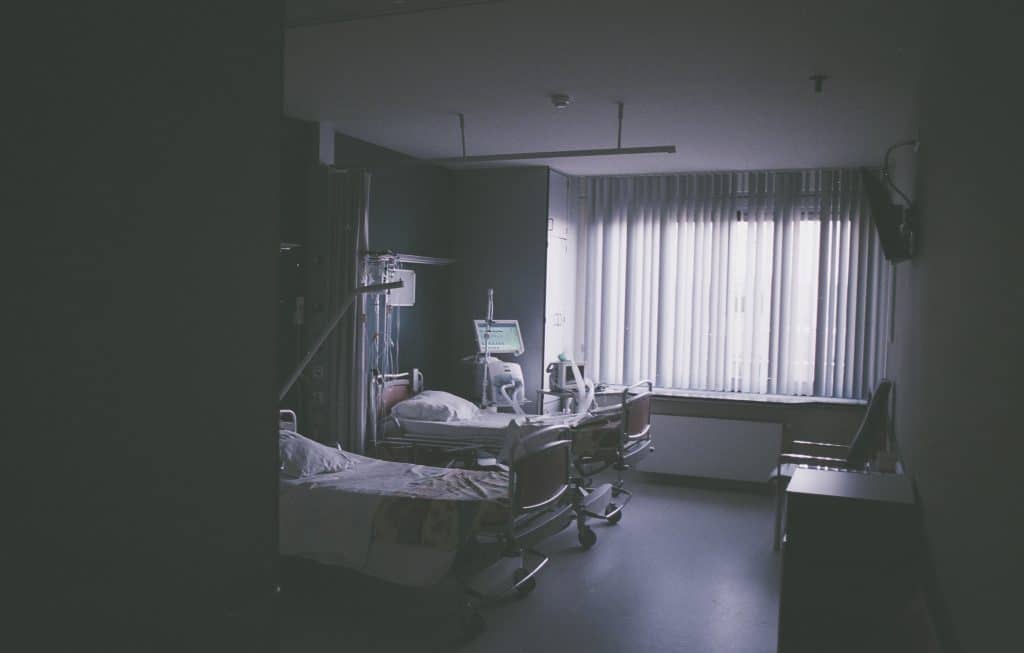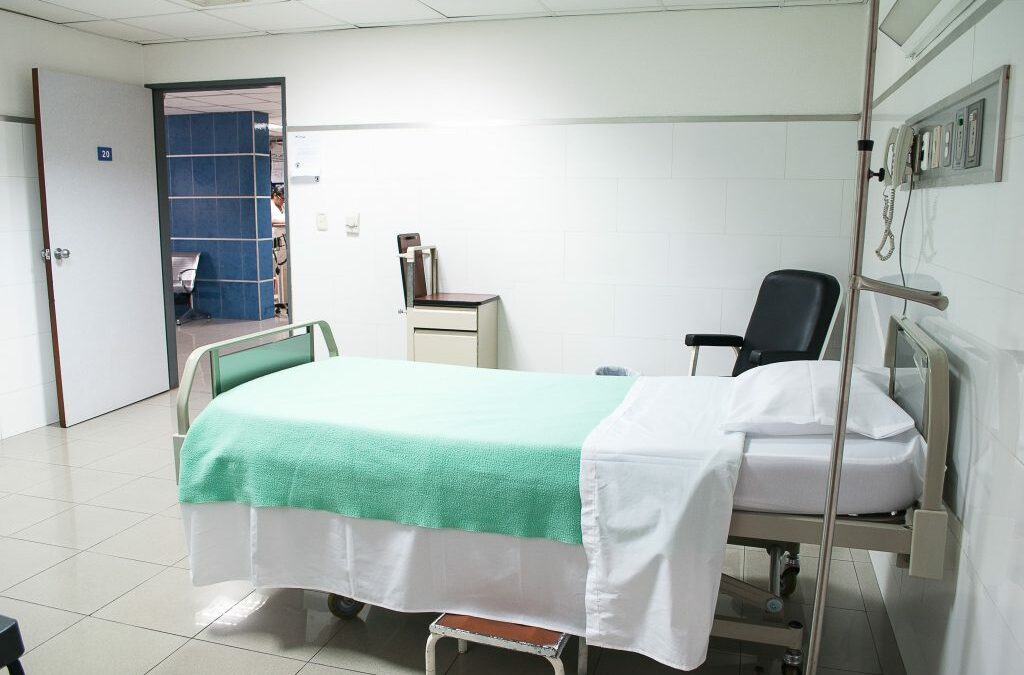Keep your staff safe from infection with these hospital cleaning guidelines.
It’s no secret that hospitals are full of infectious substances. Bodily fluids, airborne germs, and general human contact are all ways that infections spread from person to person. Hospital cleaning guidelines help to minimize this risk as much as possible, but they must be followed by all cleaners to operate at maximum effectiveness. Forgetting to disinfect even a single surface can result in cleaners, hospital staff, or visitors catching dangerous illnesses.
Most healthcare facilities have similar cleaning procedures, but they won’t necessarily all be the same, so it’s important to become familiar with the practices of each facility before cleaning them. The one guideline that is consistent and mandatory to follow is the Occupational Safety and Health Administration’s (OSHA) bloodborne pathogens standard, which we’ll get into more detail about below. You can also find guidelines from the Center for Disease Control and Prevention (CDC), which, while not mandatory, are good rules to follow.
Despite the potential differences, here are eight hospital cleaning guidelines you can follow at any facility to help keep everyone safe.
Keep track of all your cleaning jobs with Janitorial Manager. Schedule a free demo today and learn about all the great features!

How to Keep Hospitals Clean
1. Take precautions
Before you begin cleaning a hospital, it’s vital that you protect yourself and your team. Always wear personal protective equipment (PPE), such as gloves, masks, or safety glasses. In a hospital setting, you may also want to wear a paper gown to help keep infectious substances from getting on your clothes. If you’re already sick, stay away from healthcare facility cleaning as you’ll be more prone to infection. If you’re removing biohazard waste, make sure the container is locked and sealed and carry it carefully to the appropriate place of disposal. Taking these simple safety measures is one of the most effective ways to limit the spread of infections.
2. Use quality disinfectant
The cleaners sold at grocery stores aren’t powerful enough to ensure the cleanliness required of a healthcare facility. Instead, you’ll want to use EPA-approved disinfectant. These powerful chemicals kill 99% of germs found in hospitals almost on contact, so you don’t have to let the liquid linger on surfaces before wiping or mopping. These days, there are even green disinfectant options you can use to help protect yourself and the environment as well.
3. When in doubt, overclean
If you notice an area that looks like it ought to be cleaned, clean it. Even if it’s already been tended to, it’s better to stay safe by cleaning it a second time to make sure that you’ve removed all potential for infectious material.
4. Pay attention to the details
Hospital cleaning guidelines are frequently very granular to ensure the rooms, hallways, and common spaces are as clean as possible. This means paying close attention to the details of what you’re cleaning. Disinfect bed rails, phone handles and keypads, remote controls, table tops and other surfaces, trash bins, and anything else that someone might come into contact with. When mopping the floor, mop backward in an “S” formation to make sure you cover the entire area. Move furniture if you have to. Even vents and other HVAC units should be dusted and cleaned, as well as light fixtures and ceilings.
5. Remember the bloodborne pathogens standard
OSHA’s standard for bloodborne pathogens is crucial to all hospital cleaning guidelines. The standard sets rules for what to do when you’re working on a job site that may contain infectious bodily fluids, like blood and saliva. Hospitals are the most common places to find these fluids, so it’s essential to take the standard seriously and follow all protocol dictated within.
6. Use clean equipment
When you’ve mopped a floor, remove the mop-head, and replace it with a clean one when you move on to another level. After you’ve disinfected an area, remove your gloves inside-out, throw them away, and wash your hands. You may also wish to use a hand sanitizer if one is available, but there’s no substitute for washing your hands with warm water and antibacterial soap. Never use the same PPE to clean a new area as you may unintentionally spread infections that way.
7. Use a checklist
To ensure that you don’t miss any steps in the hospital cleaning guidelines, create a checklist that you can refer to on the job. Software like Janitorial Manager makes this easy with customizable checklists you can access from your mobile device, and which can be changed anytime to accommodate new hospital rules.
However you choose to do it, a checklist will help you to remember all the nuanced details of cleaning a hospital. Even seasoned veterans can benefit from a checklist because it’s easy for little things, like wiping visitor’s chairs, to slip through the cracks.
8. Properly dispose of sharps
Hospital personnel should really be responsible for sharps like needles, but sometimes you may find something on the floor, or perhaps a glass bottle falls and breaks. All of these things should be disposed of in a red sharps bin, which should be easy to find in most hospitals. Throwing these items away in a sharps bin helps prevent accidental cuts or needle pokes, which can result in severe infection even if the wound is as small as a needle tip.

The price of carelessness
While failure to follow hospital cleaning guidelines generally doesn’t result in any fines, several adverse consequences could come about. The most serious of all these is that someone, whether a worker, a patient, or a visitor, could become infected with a severe illness or disease. That may lead to lawsuits and other actions that can cost thousands of dollars, not to mention having it on your conscience that someone became sick because of carelessness.
And, of course, you may lose the cleaning job, which will likely cause your reputation to take a hit, making it harder to secure more work in the future.
All in all, it’s in everyone’s best interest to follow all hospital cleaning guidelines. This way, everyone remains safe, and you stay in business.
Why are healthcare facility cleaning services critical?
Healthcare facility cleaning services are critical in keeping facilities clean, safe, and healthy, but that’s not all. Here are four additional reasons why:
1. Functioning Medical Equipment
Medical devices need to be keep clean to function properly. Worst of all, failure to do so can require costly repairs and replacement. Regular cleaning can prevent the accumulation of dust, debris, and other contaminants in medical equipment. But with hospital cleaning procedures in place, you don’t have to worry.
2. Reduction of Allergens and Irritants
While routine cleaning can keep medical equipment from being accumulated with allergens and irritants, the same goes for patients and staff. Many people are sensitive to allergens which can effect healing-time and general comfort. High touch surface areas like doorknobs and handrails are breeding grounds for allergens and irritants. That’s why routine cleaning is essential. Another area you don’t want to neglect are your air ducts and ventilation systems. These can easily build up with dust, mold, and other contaminants.
3. Staff & Patient Safety
The prevention of cross-contamination and infections are taken seriously at healthcare facilities, but that doesn’t mean they don’t happen. In fact, the elderly, premature babies, and sick children are some of the the most vulnerable for contracting a healthcare associate infection (HAI). But when you’re taking the steps to properly clean, you’re minimizing the risk for not only patients, but staff too.
4. Positive Public Image
An unkept healthcare facility, will raise the eyebrows of visitors. Make sure all patients and the pubic maintains confidence in your medical facility through consistent and quality cleaning. This can ensure accreditation is not threatened and the community has trust in their healthcare provider.
Make checklists and track your progress with Janitorial Manager. Learn how by scheduling a free demo today!


Thanks for share this beautiful blog with such a nice information and also we are provide nyc commercial cleaning company and your blog very help full for us. and also you can check my web related to this service.. visit our website http://www.impeccablecleaningnyc.com